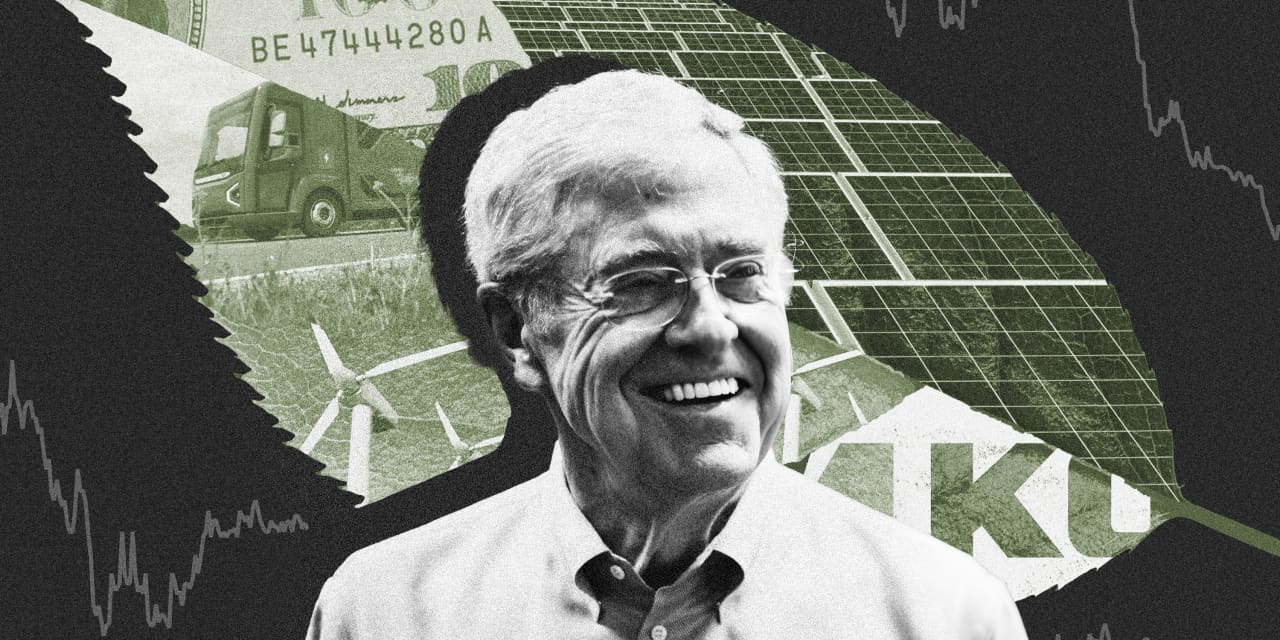After long disputing the climate impact of the fossil fuels it refined, Koch Industries took a flier on zero-emissions a few years ago. A new unit called Koch Strategic Platforms, or KSP, quickly bet over $1 billion on start-ups targeting lithium, batteries, and lithium-battery systems.
It was 2021, and the market was in love with electric vehicles and special-purpose acquisition companies, or SPACs. Koch Strategic Platforms made almost a dozen green investments through SPACs. As public companies, their stocks provide a rare peek at the investing of America’s second-largest private company.
The results might make anyone swear off the public markets. Since early 2021, the Koch Strategic picks have posted an average loss of 58% on a cap-weighted basis, Barron’s calculates. But for the profitable buyout of one firm, Koch’s picks lost 67% on average as most of the firms missed development milestones and needed more money than expected.
REE Automotive
(ticker: REE), for example, is down from a split-adjusted $335, to $3.18.
Barely two years after its launch, KSP was disbanded last November. Its holdings were parceled out to other Koch portfolios. Many of its battery plays have been sold altogether, an executive at one of the companies says he was told.
Most everyone has lost money on clean-energy stocks since early 2021. The
iShares Global Clean Energy
exchange-traded fund (ICLN) is down 56% over that period, hurt by rising interest rates and changing prices. Koch Strategic bought into the sector at the peak of the SPAC bubble, when investors put giddy valuations on unproven businesses and technologies. The battery companies that Koch picked had all of these characteristics.
“Battery companies are really, really risky,” says Donald Sadoway, a materials science professor at the Massachusetts Institute of Technology who has started a few battery ventures himself. He believes that many battery technologies funded in the SPAC spree are 15 years away from delivering a product, and that most will fail.
Koch Industries wouldn’t discuss what happened at KSP, but said in a statement that it is playing a long game in renewable energy: “Our focus remains on taking a long view in our investments in this sector and on backing disruptive companies that share our vision of delivering additive, low-cost, abundant, reliable energy sources while consuming fewer resources in the process.”
With $125 billion in annual revenue, Koch Industries can afford to wait and see whether its clean-energy bets pay off. “They really saw these investments as a kind of tuition money,” says Ricardo Rodriguez, chief financial officer at
Aspen Aerogels
(ASPN), a maker of lithium-battery insulation that got $325 million from KSP. Aspen is ramping up shipments to auto makers but has burned lots of cash in the process.
For decades, the Wichita, Kan.–based Koch conglomerate was best known for fighting regulation of its petrochemical operations and funding conservative causes favored by 88-year-old Chairman Charles Koch and his brother David. In interviews, Charles Koch now agrees that global warming is occurring, and says that his company is a leader in carbon capture. Koch Industries began diversifying from fossil fuels long ago.
In 2010, high corn prices sent ethanol refineries into the red, despite that industry’s government subsidies. A young Koch executive named Jeremy Bezdek recounted later to Bloomberg how he risked his career to argue that Koch Industries should buy into the struggling industry. Ethanol recovered, and the investment paid off. Koch became one of the country’s biggest ethanol producers.
As 2020 came to a close, electric-vehicle pioneer
Tesla
(TSLA) had shot up tenfold in a year and become the largest auto stock. The second-largest was a start-up called
QuantumScape
(QS). It had no sales or products—but it did have an exciting story about how its technology would make lithium batteries lighter and safer.
QuantumScape stock jumped from $10 to $130 in four months. Amid the euphoria, Koch Industries formed KSP to make venture investments in healthcare, computing, and batteries. KSP’s lead portfolio manager was Jeremy Bezdek.
KSP wasted no time putting money to work. In January 2021, the Koch venture agreed to become the largest investor in a $600 million private placement by a SPAC that was merging with a Norwegian battery start-up called Freyr. Bezdek said Koch saw “immense potential” in Freyr’s business.
Koch’s $115 million investment made it the largest outside holder of the merged
Freyr Battery
(FREY), with an 8% stake. Sales contracts announced by Freyr last year briefly produced a 40% gain on KSP’s $10-a-share basis. But Freyr has struggled to raise the $1.3 billion needed to open a “Giga America” factory, and the stock has dwindled to $2.07. Freyr told Barron’s that it couldn’t discuss its business until after reporting September-quarter results. Those results, released Thursday, were bad and Freyr is scaling back its ambitions.
Days after placing its bet on Freyr, KSP signed up for private placements in two more SPACs.
One merged with
Microvast Holdings
(MVST), a maker of batteries for trucks and buses, whose stock has since fallen from $22, to $1.25. The second became REE Automotive, an Israeli firm that promised a skateboard-like chassis for building EV trucks. REE told its roadshow audience that it expected to have production capacity for 40,000 EV platforms in 2021. The company has since burned through two-thirds of its $300 million in SPAC cash, without delivering a unit. CEO Daniel Barel now tells Barron’s that he could make his first 300 trucks by the end of next year.
Koch scored a win with its next SPAC bet. In April 2021, KSP put $30 million into landfill-gas gatherer Archaea Energy, at $10 a share. Six months later,
BP
(BP) agreed to buy Archaea for $26 a share.
Aspen Aerogels could well succeed, too. It has worked hard to increase production of an insulating foam that electric utilities and auto makers use to keep lithium batteries from overheating. But it required more cash than expected. Koch first bought stock at about $22 a share, then another chunk near $28. Aspen shares had dropped to $9.50 when it needed a new infusion. Koch has advanced $325 million of debt and equity to Aspen, representing over 26% of the shares outstanding.
Sales grew by 65% in Aspen’s September quarter, and the company hopes to see positive cash flow from operations next year. Those hopes have lifted Aspen stock from an August low of $5.50 to a recent $8.86.
“They have been a very good partner for us,” says Aspen CFO Rodriguez of Koch. “But I don’t see them as somebody we can go to for additional funding now.”
The public markets are often less patient than a privately funded business like Koch. They also expose a business to the scrutiny of short sellers. Several of KSP’s investment plays drew the attention of shorts.
Li-Cycle Holdings
(LICY) raised over a half-billion dollars in a 2021 SPAC deal to build a network of recycling centers where Li-Cycle would use its proprietary technology to recover lithium from spent batteries. Koch Strategic Platforms didn’t buy shares in the deal’s private placements—instead taking the less risky route of lending $100 million in a convertible note that could become shares of Li-Cycle if the stock did well.
The stock didn’t do well. One reason may be a March 2022 report by the Texas hedge fund Blue Orca Capital that raised questions about Li-Cycle’s accounting and capital requirements. Defending itself against a shareholder suit that piggybacked on the short seller’s report, Li-Cycle said the allegations were without merit.
Another shoe dropped a few weeks ago, when Li-Cycle announced it was pausing construction at the Rochester, N.Y., facility where it planned to deploy its recycling technology. Construction costs were climbing, Li-Cycle said, and a long-awaited government loan hadn’t yet come through. From a level of $13 when KSP got involved, Li-Cycle stock now goes for $1.66. The company told Barron’s it couldn’t talk before next week’s earnings report.
Eos Energy Enterprises
(EOSE) had burned through $360 million in a decade of trying to sell batteries to electric utilities, when KSP lent it $100 million in a convertible note. The battery developer says it has an order backlog of $540 million, but a short seller noted in July that half of the orders are from a business whose assets were seized by creditors. EOS told investors on Tuesday that its backlog was solid. The stock has fallen from $17.60 to $1.36 since Koch’s backing.
Standard Lithium
(SLI) is another Koch pick that has drawn the shorts’ attention. In 2021, KSP invested $100 million at $7.40 a share in the company, which claims a proprietary technology for recovering lithium from its underground claims in Arkansas and Texas. A pool of salt brine called the Smackover formation crosses under those states, and promises a domestic source of the battery metal.
Exxon Mobil
(XOM),
Albemarle
(ALB), and
Tetra Technologies
(TTI) are all planning projects in the area.
Short reports by Blue Orca and Hindenburg Research detailed their concerns about the company’s lithium extraction process and its origins in Vancouver’s wild penny stock market. Standard Lithium defended its technology’s value but didn’t address the other criticisms.
Standard Lithium’s provenance is interesting. It started as a Vancouver shell company run by a longtime stock promoter named Steve Bajic. In 2020, the U.S. Securities and Exchange Commission charged him with helping a ring of stock swindlers dump the shares of dozens of companies over the preceding five years, through secret offshore trades. When Standard Lithium’s current CEO Robert Mintak took office in 2017, the lithium company continued to operate out of Bajic’s Vancouver office suite.
In three years of pretrial proceedings, Bajic hasn’t yet filed an answer in court, and his attorney declined to comment to Barron’s. Standard Lithium initially promised an interview with Mintak, but stopped responding after hearing Barron’s questions.
As for the shorts’ doubts about Standard Lithium’s proprietary technology, a September feasibility study by the company acknowledged that the Arkansas project will go forward with a more efficient technology developed by Koch.
These shortcomings may not matter to Koch, if it thinks it can make something of the Smackover lithium in the long run. In the short run, the market has marked down Standard Lithium shares to a recent $2.65, less than half what Koch paid for its shares.
In November of 2022, the conglomerate shut down KSP and moved its investments to other portfolios, such as Koch Disruptive Technologies, which is overseen by Charles Koch’s son, Chase. Koch Strategic portfolio manager Bezdek found a job at Freyr Battery, while his boss took a job at Standard Lithium. Bezdek didn’t respond to queries from Barron’s.
Koch Industries told Barron’s that it will continue to pursue clean energy. “As the energy landscape continues to evolve, Koch Disruptive Technologies is bringing added value to the market through investments in companies with technologies that span the energy value chain, from electricity generation and storage to transmission and distribution,” the company said.
Write to Bill Alpert at william.alpert@barrons.com
Read the full article here












Leave a Reply